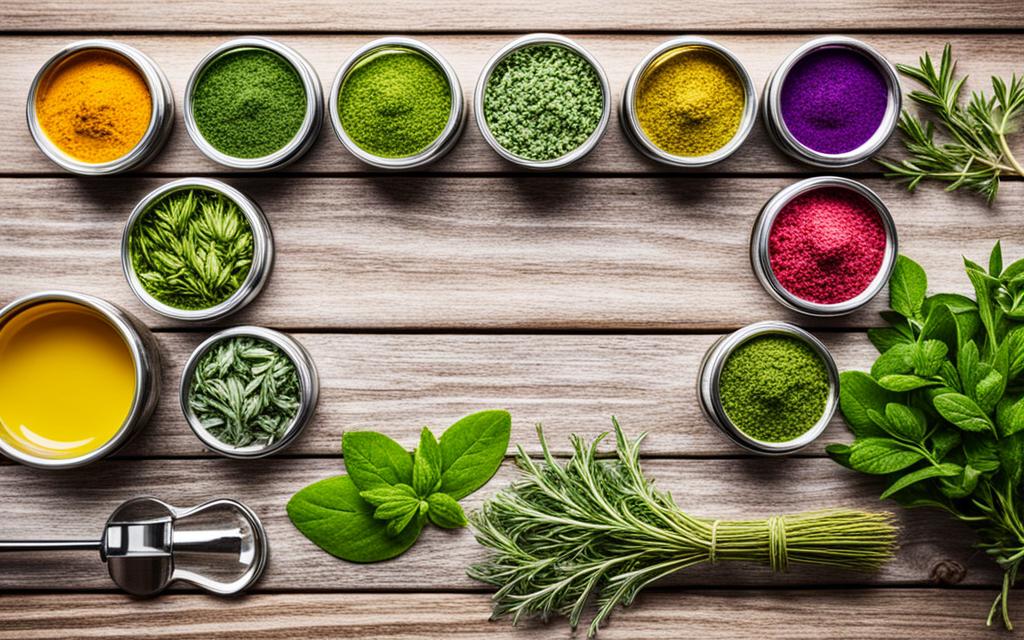Naturopath Herbals: Your Guide to Natural Healing
Naturopath herbals integrate the wisdom of nature with traditional healing practices. They are key to achieving holistic wellness. For those eager to explore nature’s healing power, you’ve found the right place. This guide reveals how herbal medicine supports the body’s natural healing process. It prepares you for a life-changing journey towards wellness.
Key Takeaways
- Discover what naturopath herbals are and their role in natural healing.
- Understand how herbal medicine fits within the broader scope of holistic wellness.
- Learn about the benefits of integrating naturopath herbals into your daily life.
- Gain insight into the philosophies that underpin naturopathy and its practices.
- Prepare to explore natural remedies and their connection to overall well-being.
Understanding Naturopath Herbals
Exploring naturopath herbals takes you back to the start of herbal medicine. This form of alternative medicine has deep roots in ancient wisdom. It uses nature’s power to heal and improve well-being. Our journey will cover both the traditional and modern uses of herbs, showing their importance in today’s health-focused world.
Looking into naturopath herbals reveals a fascinating world of plants. Each plant has its own healing abilities. These natural remedies come in different forms like teas, tinctures, and capsules. They offer a versatile way to health that works alongside modern medicine.
The history of these herbs makes us understand their current role in alternative medicine better. For centuries, people all over the world have used herbal medicine. They prefer it for its few side effects and for treating the root cause of illnesses, not just the symptoms.
Herbal medicine seeks to empower the body’s healing mechanisms, facilitating a natural return to health.
- Origin in ancient practices
- Application in modern healing settings
- Integration into daily health routines
Below is a table that sorts common naturopath herbals by type and their health benefits. This overview is perfect for beginners in herbal medicine:
| Herb Type | Health Benefits |
|---|---|
| Chamomile | Reduces inflammation, aids sleep |
| Ginger | Improves digestion, alleviates nausea |
| Echinacea | Boosts immune system, fights infections |
| Lavender | Relieves stress, promotes relaxation |
| Ginkgo Biloba | Enhances cognitive function, supports circulatory health |
The Philosophy Behind Holistic Healing
At the heart of each wellness center is a deep commitment to holistic healing. This focuses on the complete health of physical, emotional, and spiritual aspects. We will look into the key principles of naturopathy that drive holistic methods. These principles link the mind, body, and spirit in seeking health and wellness.
The Principles of Naturopathy
Naturopathy believes the body can heal itself and stay balanced. It supports using natural remedies like herbs, diet, and adjusting lifestyle. The main ideas of naturopathy are to treat the whole person, not just symptoms, and to focus on prevention.
The Connection Between Mind, Body, and Spirit
The strong link between the mind, body, and spirit is key in holistic healing. This whole approach sees that each part of a person is important in healing. It understands that emotional and spiritual health can greatly affect physical health.
Here’s a closer look at how these elements work together in wellness centers focusing on holistic healing:
| Element | Role in Holistic Healing | Typical Practices |
|---|---|---|
| Mind | Enhances self-awareness and stress management | Meditation, biofeedback,cognitive therapy |
| Body | Maintains physical health and prevents disease | Nutritional counseling, yoga, acupuncture |
| Spirit | Aligns values and promotes inner peace | Spiritual or healing retreats, energy healing |
Using naturopathy principles in your life leads to a more balanced health approach. A wellness center that focuses on holistic healing offers help and resources. It helps explore these life-changing practices, creating a balance among mind, body, and spirit.
Navigating the World of Natural Remedies
Exploring natural remedies means learning about herbs and how they work with your body. It’s key to pick the right herbal supplements. This ensures you get their full benefits in a safe way that fits your health needs.
Identifying Quality Herbal Supplements
It’s vital to choose high-quality herbal supplements. Look at the labels for ingredients, amounts, and third-party checks. Trustworthy certifications, like the U.S. Pharmacopeia (USP) or Non-GMO Verified, show a product’s quality and safety.
- Look for full ingredient transparency—every element of the supplement should be clearly listed.
- Check for certifications that indicate rigorous testing and quality assurance.
- Understand the therapeutic dosage, ensuring the supplement contains an effective yet safe quantity of the active ingredients.
How Herbs Interact with Your Body
Herbs affect your body in different ways. They can help with nutrient absorption, metabolism and even detox. This makes them effective but also means you need to use them carefully.
For example, turmeric supplements often include black pepper extract, which enhances curcumin absorption significantly.
| Herb | Primary Effect | Common Interaction |
|---|---|---|
| Ginger | Anti-inflammatory | Enhances stomach emptying |
| St. John’s Wort | Mood support | May interact with prescription antidepressants |
| Ginseng | Energy boost | Can decrease blood sugar levels |
Knowing how your body and herbs interact is key for safe, effective use.
When diving into herbal supplements, think about both benefits and risks. Making well-informed choices means understanding how these remedies affect you and any medicines you’re taking.
The Role of a Naturopathic Doctor
A naturopathic doctor plays a key role in alternative medicine. They use herbal remedies and natural treatments. Their focus is on prevention and treating the whole person, not just symptoms.
Naturopathic doctors work to understand each person’s unique health needs. They look at physical, mental, and lifestyle factors. Then, they craft a treatment plan that may include diet changes, new lifestyle habits, and herbal remedies.
By harnessing the power of nature, we can achieve a balanced state of health that aligns with the body’s inherent ability to heal itself.
Naturopathic doctors focus on teaching their patients. They help you understand your treatments. This helps you be part of your health journey.
- Consultation and assessment to understand the patient’s health history and goals
- Integration of herbal remedies into health plans
- Education on lifestyle modifications to support overall wellness
This shows how naturopathic doctors compare to conventional treatments. It’s a good look at how alternative medicine works.
| Condition | Conventional Treatment | Naturopathic Treatment |
|---|---|---|
| Anxiety | Prescription Medications | Herbal Remedies, Mindfulness Techniques |
| Diabetes | Insulin Therapy | Dietary Changes, Herbal Supplements |
| Chronic Pain | Opioids | Acupuncture, Nutritional Counseling |
Top Herbal Supplements for Everyday Wellness
Using herbal supplements can greatly improve your daily health routine. They are not just good for digestive health and immune support but also gently boost your general well-being.
Herbs for Digestive Health
Keeping your digestion in check is key for a healthy life. Supplements with fibers and calming effects support your gut and ease digestive problems. Adding herbs like ginger, peppermint, and chamomile to your diet helps your digestive wellness.
Herbs for Immune Support
If you want to strengthen your immune system, some herbs are known for that. Echinacea, elderberry, and astragalus are top choices for fighting off illness.
| Herb | Benefits for Digestive Health | Benefits for Immune Support |
|---|---|---|
| Ginger | Improves digestion, reduces nausea | Anti-inflammatory properties help fight infections |
| Peppermint | Soothes the stomach, reduces bloating | Antiviral properties, enhances immunity |
| Chamomile | Calms an upset stomach, promotes smooth digestion | Antibacterial, supports immune system function |
| Echinacea | Enhances gut health by supporting healthy immune response | Boosts immune system, reduces cold and flu symptoms |
| Elderberry | Reduces inflammation in the gut | High in antioxidants, supports immune defenses |
| Astragalus | Protects intestinal barrier, aids in digestion | Increases production of immune cells |
Popular Herbal Remedies and Their Uses
People are turning to herbal remedies for natural, effective solutions for common health issues. These remedies support overall health and are tailored to meet individual health needs through specific herbal mixes.
Natural Solutions for Common Ailments
Herbs offer many benefits for various health problems. For example, chamomile helps reduce stress and improve sleep. Echinacea boosts the immune system, especially during cold and flu season.
Custom Herbal Formulations
Custom herbal mixes are powerful. A skilled herbalist can create specific blends for individual health conditions. This ensures care that matches your unique health needs.

If you want to reduce anxiety, improve digestion, or strengthen your immune system, there are herbal solutions. Working with a professional to create these blends means you get safe, effective, personalized care.
Discovering the variety of herbal remedies and custom formulations could be the natural way to better your health. It’s a sustainable approach to wellness.
Integrating Herbal Medicine into Your Lifestyle
Herbal medicine boosts holistic wellness, offering natural solutions that match your body’s needs. Whether starting fresh or enhancing your herb routine, the focus should be on regular use and appreciating the benefits. This practice promises to elevate your wellbeing naturally.
Creating a Daily Herbal Routine
Starting your day with herbal supplements encourages a mindful, health-oriented lifestyle. Adding herbal teas or tinctures like ginger or turmeric to your morning helps with inflammation. These herbs can really kickstart your day positively.
During the day, adaptogens such as ashwagandha help manage stress. At night, chamomile or lavender can help you relax and sleep better. Each plays a special role in maintaining balance and health.
- Morning: Start with a cup of herbal tea or a smoothie infused with greens like spirulina.
- Afternoon: Incorporate a natural herbal supplement with lunch to aid digestion and energy maintenance.
- Evening: End your day with a calming herbal blend suitable for promoting rest.
Making Herbalism a Part of Holistic Wellness
Herbal medicine supports not just in treating ailments but also in living a holistic lifestyle. It means listening to your body’s seasonal needs, knowing which herbs to use, and connecting with nature. This practice enhances your overall wellness journey.
A daily herb routine boosts not only physical health but also mental and emotional well-being. Notice the changes in your health, energy, and stress levels. This holistic approach has far-reaching benefits.
Whether you’re a newbie or a seasoned herbalist, incorporating herbs into your life is rewarding. Small, mindful choices each day connect you with nature’s power. This leads to a balanced, healthy living.
Naturopath Herbals for Chronic Conditions
Naturopath herbals have become key in supporting chronic conditions. They bring a holistic touch to natural healing. They focus on the body’s power to heal itself. Naturopath herbals can help with ongoing health issues, often with fewer side effects than mainstream drugs.
These herbals do more than just relieve symptoms. They tackle the root causes of problems. This leads to better overall health and easier symptom control. Let’s explore how herbal remedies assist in treating various chronic issues.
- Anti-inflammatory properties: Many herbs can lessen inflammation, a big cause of chronic issues.
- Stress reduction: Adaptogenic herbs are great for stress relief, a key player in chronic diseases.
- Immune system modulation: Some herbs can boost and balance the immune system, helping manage chronic conditions.
Think about using naturopath herbals as part of a well-rounded care plan. Make sure to work with a health expert who knows naturopath herbals and natural healing. This combined method can notably improve life and health.
It’s key to remember that while naturopath herbals have many positives for chronic conditions, they should add to, not replace, standard medical care. Always chat with your healthcare team before starting new treatments. This ensures they’re safe and fit for your health needs.
Herbs and Their Healing Properties
Exploring herbal medicine shows us many plants with great health benefits. Herbs with anti-inflammatory properties and adaptogens are very helpful. They promote healing and improve well-being.
Anti-inflammatory Herbs
Anti-inflammatory herbs help manage inflammation, which causes many chronic diseases. Adding these herbs to your daily life can reduce inflammation. This improves your overall health.
Adaptogenic Herbs
Adaptogens are unique herbs that help your body handle stress. These herbs are key in today’s busy world. They help keep your body functions stable.
| Herb | Type | Main Benefits |
|---|---|---|
| Turmeric | Anti-inflammatory | Reduces inflammation, supports joint health |
| Ginseng | Adaptogen | Boosts energy levels, aids stress management |
| Ginger | Anti-inflammatory | Relieves nausea, reduces muscle pain |
| Ashwagandha | Adaptogen | Improves stress resilience, supports adrenal function |
Alternative Medicine vs. Conventional Treatments
In today’s healthcare world, there is more talk about alternative medicine and conventional treatments. Knowing the differences helps people choose the best health care for themselves.
Pros and Cons of Naturopathic Approaches
Alternative medicine focuses on healing the whole body. It especially helps with prevention and chronic issues. But, it may work slower and varies in results.
Combining Naturopathy with Conventional Medicine
Mixing combining therapies from both worlds is becoming popular. This mix can lead to a better, more rounded way of treating patients. Conventional medicine offers quick fixes and high-tech help.
Naturopathy adds long-lasting health and prevention. Together, they make a powerful team.
Acknowledging the good and bad of alternative medicine and conventional treatments leads to better health choices. Combining them tailors care to the individual for better results.
Building Your Home Apothecary
Starting your own home apothecary is rewarding. It lets you use herbal medicine daily. This guide shows you the essential herbs and gives tips for their storage and use. This ensures they stay potent and fresh.
Pick a cool, dry place for your apothecary. It should be out of direct sunlight and away from moisture and heat. A cupboard in a cool room or a shady kitchen corner works well.
- Chamomile: Known for its calming properties, ideal for teas.
- Lavender: Great for stress relief and also adds a pleasant aroma to any room.
- Peppermint: Useful in soothing digestive issues and making refreshing herbal teas.
- Echinacea: Known to boost the immune system, especially beneficial during cold and flu season.
Storing your herbs right is key to keeping their healing power. Start with glass jars that seal tight. This keeps the air out and stops the herbs from getting weak. Put a label on each jar with the herb’s name and when you stored it. This keeps your herbs fresh longer and makes it easy to find them when you need them.
- Decide on your goals: What health benefits do you want? Knowing this helps you pick the right herbs.
- Research: Each herb has its own care needs and uses. Learn these to use them well.
- Expand slowly: Begin with a few herbs and add more as you learn and get comfortable.
Using your home apothecary regularly and adding new herbs keeps it in tune with nature’s cycles. Enjoy learning and feel better by adding herbal medicine and natural remedies to your routine.
Precautions and Considerations in Using Herbal Remedies
Herbal remedies can greatly help in managing health. But it’s important to be careful, especially about side effects and talking to a doctor. Knowing these things will keep you safe. It will also make these treatments work better for you.
Understanding Side Effects and Interactions
Like any medicine, herbal remedies have side effects. They can affect how other medicines work, including prescriptions and other herbs. For example, St. John’s Wort is often used for depression. But, it can make birth control pills less effective. This can lead to unexpected health issues. It’s key to know about these effects for your safety.
Consulting with Healthcare Providers
Before starting any herbal remedies, talk to a healthcare provider. They can give advice that fits your health history and the medicines you’re already taking. This step prevents bad reactions. It makes sure the herbs help you as much as possible, without harming your health.
“Natural” doesn’t always mean “safe.” That’s why getting advice from a professional is so important. Keeping these things in mind lets you use herbal remedies safely. And you get the most benefit from their natural healing power.
Finding a Reputable Wellness Center for Natural Healing
When you start exploring natural healing, picking the right wellness center is key. You need to trust where you’ll get advice and treatment. Many places claim to offer complete care, but not all have the right skills or approval. It’s important to find a trustworthy clinic. This ensures you get the best care in naturopathy.
What to Look for in a Naturopathic Clinic
Looking for a naturopathic clinic, check the services they offer match your health goals. A good wellness center has many therapies, like herbal treatments and nutrition advice, to improve your health. They should be open about their methods and who works there. Ask about how well their treatments work. Also, listening to stories from their clients can show you what to expect.
The Importance of Certified Practitioners
A sign of a reliable naturopathic clinic is having certified practitioners. These experts have completed intense training and earned certifications in naturopathy. They keep up with new studies on herbs and can create custom health plans. Picking a clinic with certified staff means your health is with real pros. They can guide you well on your journey to natural healing.
FAQ
What are naturopath herbals?
Naturopath herbals use plants and natural substances to heal. This approach, called naturopathy, is about natural healing. It uses the body’s own ability to heal and stay healthy. Herbal medicine is a big part of this.
How do herbal supplements interact with the body?
Herbal supplements have active parts that affect the body. They can help organs, boost functions, or give nutrition. Herbs work with the body’s chemistry, affecting things like enzymes and hormones.
What principles guide naturopathic healing?
Naturopathic healing follows key ideas. These include the healing power of nature and finding the cause of issues. It also means doing no harm, educating patients, treating the whole person, and focusing on prevention.
Can naturopath herbals be used for chronic conditions?
Yes, for chronic conditions, naturopath herbals can help. They may reduce symptoms and improve wellbeing. Always talk to healthcare experts before using these herbal remedies.
How do I integrate herbal medicine into my lifestyle?
Start a daily herbal routine. This could include teas, tinctures, or capsules. Learn about different herbs, their uses, and doses. A naturopath or herbalist can help make this fit your health needs.
Are there potential side effects to using herbal remedies?
Herbal remedies can have side effects or affect medications. It’s important to know these possible reactions. Always use them with healthcare advice, especially if you have health conditions or take other drugs.
How do I find a reputable naturopathic clinic or wellness center?
Look for certified naturopathic practitioners at clinics. Ask people you trust for recommendations. Check reviews. Make sure they focus on holistic, patient-centered care and are open about their practices.







